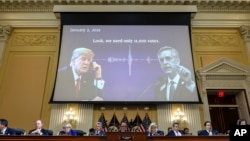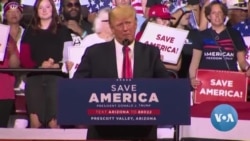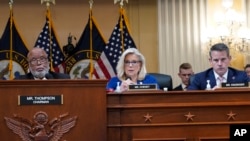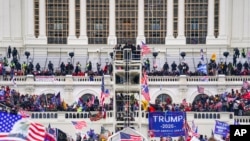The congressional panel investigating the riot at the U.S. Capitol on January 6 of last year unanimously voted Thursday to subpoena former President Donald Trump to testify about his role in stoking the violence and his weeks-long efforts to upend his loss in the 2020 election.
“We need to hear from Donald Trump,” the committee chairman, Congressman Bennie Thompson of Mississippi, said. He said Trump needs to “answer for his actions … part of his scheme to stay in power.”
“We have an obligation to see President Trump’s testimony … in full view of the American public,” Thompson said.
The committee’s vice chair, Congresswoman Liz Cheney of Wyoming, said the panel “must see the testimony of January 6th’s key player” because numerous Trump aides refused to answer the committee’s questions, choosing instead to invoke their constitutional right against self-incrimination. Trump helped to defeat Cheney in her bid for reelection to the next Congress.
All nine committee members in a televised roll call vote favored the Trump subpoena, seeking his testimony and documents he might have relating to his efforts to stay in office rather than to acknowledge he had lost to Democrat Joe Biden, now the country’s 46th president.
Whether Trump, a Republican, would cooperate with the Democrat-dominated committee or would try to block its subpoena, is in question.
Trump spokesman Taylor Budowich said the former president would not be intimidated by the committee's "meritless rhetoric or un-American actions” in voting for the subpoena. The spokesman in a tweet also called the committee’s members “bitter, power hungry & desperate.”
Trump has contested other efforts to question his presidential and post-presidential actions, filing repeated legal challenges, sometimes winning, sometimes losing, but always delaying a final resolution.
To this day, Trump falsely claims he was cheated out of reelection because of voting irregularities in several states he narrowly lost to Biden.
He has called the select House of Representatives committee — seven Democrats and two vocal anti-Trump Republicans — “political thugs and scoundrels.”
In its final public hearing unless Trump agrees to testify, the committee showed a collection of videos of the mayhem at the Capitol 21 months ago and snippets of testimony from Trump aides who repeatedly told him he had lost reelection and that whatever irregularities might have occurred in the voting or vote-counting were not enough to upend the outcome.
The committee said he lost 61 of 62 legal challenges in the various states he lost narrowly to Biden, and the one case was inconsequential to the national outcome.
The committee contends that Trump had a premeditated plan to declare victory on election night on November 3, 2020, whether he was winning or losing, which is what he did at the White House in the early hours of November 4 even though the election outcome was in doubt at the time.
Trump called the continued vote-counting — millions of mail-in ballots that heavily favored Biden — “a fraud on the American people. Frankly, we did win.”
Trump ignored or rebuffed aides’ admonitions to acknowledge Biden’s victory in the following weeks, leading up to the mayhem at the Capitol two months later as lawmakers were in the early stages of certifying Biden’s Electoral College victory.
At one point, the panel showed a video clip of a Trump aide, Alyssa Farah Griffin, who visited him in the Oval Office as a television newscast happened to be showing a picture of Biden.
“Can you believe I lost to that [f-ing] guy?” Trump said, according to Griffin. But publicly, Trump continued to tell millions of his supporters he had won the election.
Thursday’s hearing unfolded less than a month before nationwide congressional elections on November 8, in which Democrats’ narrow political control of Congress is at stake, and two years ahead of the 2024 presidential election, with Trump, a Republican, signaling he is likely to mount a new run for the White House against Biden.
Witnesses at the earlier hearings in June and July said Trump repeatedly pressured Vice President Mike Pence to block Congress on January 6, 2021, from certifying the Electoral College vote. Pence refused to acquiesce to Trump’s demand, drawing his ire as Trump-supporting rioters stormed the Capitol.
Some of the rioters, more than 800 of whom have been arrested, shouted “Hang Mike Pence!” a suggestion one Trump aide said the president thought was appropriate. Gallows had been erected on the National Mall within eyesight of the Capitol.
Trump, witnesses said, also considered sending the names of fake, Trump-supporting electors to the Capitol for the official Electoral College vote count to replace the official Biden electors in states Trump lost by narrow margins.
Trump is facing several criminal investigations stemming from his actions as he tried to remain in power, including a sweeping Justice Department probe into whether he helped foment the Capitol riot by urging his supporters to go there and “fight like hell” as lawmakers were certifying his loss.
In the southern state of Georgia, a prosecutor in Atlanta, the state capital, is investigating Trump’s request to the top state elections official to “find” him 11,780 votes, one more than he needed to overturn his 11,779-vote loss to Biden.
The state-by-state vote counts are essential in U.S. presidential elections because the country’s leader is not elected by the national popular vote count, which Biden won by more than 7 million votes. Rather, the outcome is effectively determined in the Electoral College, with each state’s number of electors roughly determined by its population, with the biggest states holding the most sway. In most cases, all of a state’s Electoral College votes go to the popular vote winner in that state.
The House investigative committee has no power to bring criminal charges against Trump but could make a criminal case referral to the Justice Department in a final report it expects to complete before the end of this year. If Republicans succeed in taking control of the House starting in January, they will almost certainly disband the committee.
The subpoena of Trump could easily delay the committee’s efforts to close the investigation by December.
Since its last public hearings, the committee obtained more than 1.5 million pages of documents and communications from the Secret Service, the presidential security agency. They include details of how agents blocked Trump’s attempts to join his supporters at the Capitol even after their assault on the country’s seat of government had already erupted.
Trump, after rallying his supporters near the White House to “stop the steal” of the election, angrily berated a Secret Service agent when he realized his security detail was taking him back to the White House, where witnesses say he watched the riot on television for more than three hours before publicly urging his supporters to go home.










